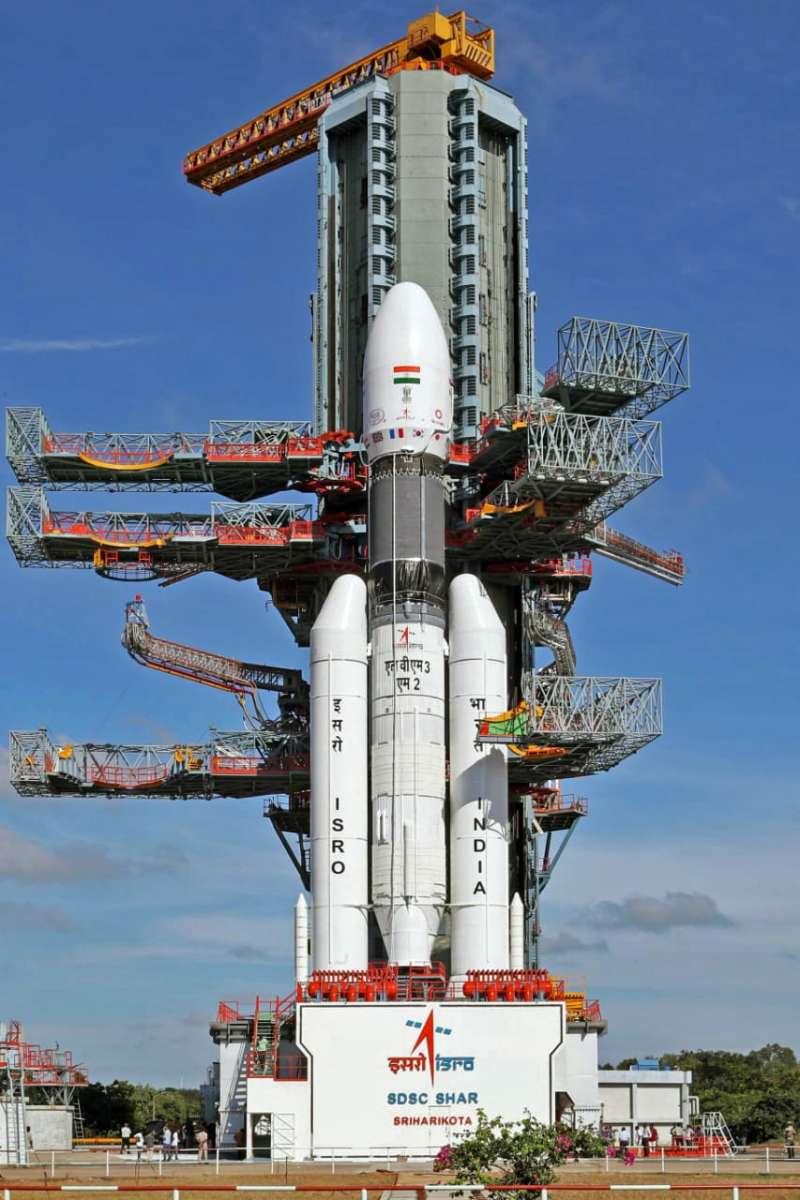OneWeb Chairman Sunil Bharti Mittal said: “It is a historic day for the Indian space sector. It is a new chapter for India in the space sector.”…reports Venkatachari Jagannathan
In a historic maiden commercial flight, an Indian heavy-lift rocket GSLV MkIII – renamed for this mission as LVM3 M2, successfully placed 36 satellites of UK-based OneWeb into orbit.
With this, India has put one more rocket to compete in the global commercial satellite launch market.
The 43.5 metre tall and weighing 644 ton LVM3 M2 rocket, carrying 36 satellites weighing totally 5,796 kg or about 5.7 ton, blasted off from the second launch pad at the Satish Dhawan Space Centre at 12.07 a.m.
With the thick orange flame at its tail, the rocket lit up the clear midnight sky, and growling it went up.
About 20 minutes into its flight, the LVM3 began slinging the satellites of Network Access Associated Ltd (OneWeb) into low earth orbit (LEO).
Indian Space Research Organisation (ISRO) Chairman S.Somanath told reporters: “The satellite separation is a slow process. All the satellites got separated successfully. The rocket’s cryogenic engine was at its best.”
OneWeb Chairman Sunil Bharti Mittal said: “It is a historic day for the Indian space sector. It is a new chapter for India in the space sector.”
Mittal said OneWeb had put a request to ISRO for the launch of its satellites a few months back and the space agency accepted the challenge to carry out two launches of 36 satellites each.
Referring to OneWeb’s planned launch of its Gen2 satellites, Mittal said the company may need about 12-16 launches and ISRO will have a major role to play.
“There is a shortage of launch vehicles and ISRO now has a great opportunity,” Mittal added.
According to D.Radhakrishnan, CMD of NewSpace India Ltd (NSIL), ISRO’s commercial arm, the GSLV MkIII has made a remarkable entry into the commercial satellite launch market.
He also said that this is the beginning of many more business associations with OneWeb.
With the latest successful mission, ISRO has put into orbit a total of 381 foreign satellites.
Another set of 36 satellites from OneWeb is planned to be put into orbit in January 2023. The UK company has contracted with NewSpace India Ltd (NSIL) to pay over Rs 1,000 crore for both launches.
OneWeb is a joint venture between India Bharti Global and the UK government.
The satellite company plans to have a constellation of about 650 satellites in low earth orbit (LEO) to offer communication services.
According to ISRO, the OneWeb Constellation operates in an LEO Polar Orbit.
The LVM3 is a three-stage rocket with the first stage fired with liquid fuel, the two strap-on motors powered by solid fuel, the second by liquid fuel and the third is the cryogenic engine.
The ISRO’s heavy-lift rocket GSLV MkIII has a carrying capacity of 10 ton to the LEO and four-ton to the Geo Transfer Orbit (GTO).
Normally the GSLV rocket is used for launching India’s geostationary communication satellites. And hence it was named as GeoSynchronous Satellite Launch Vehicle (GSLV). The GSLV MkIII refers to the third-generation rocket.
As the rocket that flew on Sunday morning was for orbiting the satellites in LEO, the ISRO has renamed GSLV MkIII as LVM3 (Launch Vehicle MkIII).
The rocket mission has several firsts for the Indian space sector. It is the first commercial launch of GSLV MkIII and for the first time, an Indian rocket will be ferrying a payload of about six tonnes.
Similarly, OneWeb is using an Indian rocket to put its satellites into orbit for the first time. Also, it is the first commercial launch of GSLV MkIII contracted by NewSpace India Ltd (NSIL), the commercial arm of ISRO, and for the first time, a renamed GSLV MkIII is being used for launching satellites in LEO.
OneWeb pays over Rs 1,000 cr
The UK-based Network Access Associated Ltd (OneWeb) will be paying over Rs 1,000 crore to the Indian space agency to launch its 72 satellites, said a top group official.
He also said OneWeb’s merger with French satellite company Eutelsat Communications is likely to be completed around April-May of 2023. OneWeb will be a 100 per cent subsidiary of Eutelsat Communications.
Speaking to reporters here, Sunil Bharti Mittal, Chairman, OneWeb, said the company will be paying Indian Space Research Organisation (ISRO)/NewSpace India Ltd over Rs 1,000 crore for launching 72 satellites.
The first batch of 36 satellites will fly on ISRO’s rocket LVM3 at 12.07 a.m. on Sunday. OneWeb will also use ISRO’s another LVM3 rocket in January to launch 36 satellites.
OneWeb plans to have a constellation of 648 satellites in LEO to offer its broadband services across the world.
“Nearly 10 per cent of OneWeb’s satellites will be launched by ISRO,” said Shravin Mittal, Managing Director, Bharti Global.
Queried about the prospects of sourcing its Gen2 satellites from ISRO, Sunil Mittal said the discussions are on. OneWeb will look at India’s Polar Satellite Launch Vehicle (PSLV) to orbit some of its satellites as replacements in space.
Queried about any changes in constellation configuration following the decision to merge OneWeb with Eutelsat Communications, Massimiliano Ladovaz, Chief Technology Officer, OneWeb, said there is no change in respect of Gen1 satellite constellation.
Ladovaz also said the request for quote (RFQ) for manufacturing of Gen2 satellites will be issued by the end of this year.
Officials of OneWeb and ISRO on Saturday held a meeting where the possibility of ISRO participating was also discussed.
According to Sunil Mittal, by the middle of next year, OneWeb will start offering its broadband service mainly focused on the business-to-business segment.
When asked about the competition, he said the market is big enough to have three or four satellite constellations.
Asked if three or four constellations with several hundreds of satellites orbiting in the space will increase the space debris, Ladovaz said OneWeb satellites are designed in such a manner that it would not become a debris.

Leave a Reply